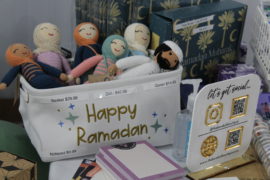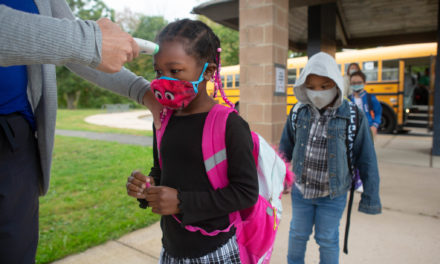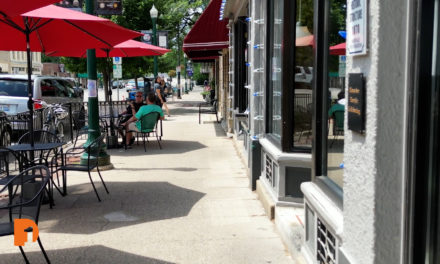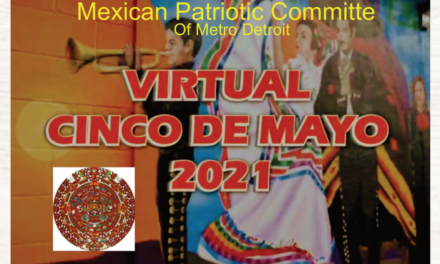It was a normal weekend in March for many Westland residents this past weekend, but for the Muslim community in western Wayne County, preparations for Ramadan are underway through a new Ramadan market featuring more than 20 makers, artisans and entrepreneurs. The first-ever Ramadan market, envisioned by Fatima Siddiqui of Flowing Script Calligraphy, showcased housewares, clothing, artwork and, of course, delicious food in anticipation for Ramadan to begin April 2.
RELATED: The Pandemic’s Effect on Ramadan and Cultural Gatherings

Photo by Frances Kai-Hwa Wang, PBS NewsHour
PBS NewsHour’s Community Correspondent Frances Kai-Hwa Wang and One Detroit Senior Producer Bill Kubota visits the market to talk with several of the vendors, including Mona Musa’s Taste of Egypt, Not Your Basic Batch, Bushra Murad’s Barakah Boutique, Fatima Ahmad’s Color Valley Designs and more to better understand the history of the Islamic holiday, the impact COVID-19 had on Ramadan and the importance of showcasing the holiday tradition in metro Detroit in the years to come.
Another Ramadan market, Violets Eid Mela, will be open to metro Detroit residents 12-6 p.m. March 26 in Warren.
Full Transcript:
Frances Kai-Hwa Wang: A March Saturday in Westland, Western Wayne County. It’s a Ramadan market, a gathering of makers, artists and entrepreneurs, mostly women, selling their wares in anticipation of the upcoming month of Ramadan.
Fardusse Jaigirdar, Aynaa Events and Decor: And what makes us really unique, is that we’re a woman-only business, and we want to provide a platform for other women through our collaborative to join us, so that we can eventually become a full-service event venue where people can come in and find catering and baking and all of that. So that is our goal right now.
Frances Kai-Hwa Wang: Michigan Ramadan Market, a new idea for Metro Detroit. The women of “Aynaa Events and Decor” helped put the event together. Housewares, clothes, art and a lot of food. Caterer Zafreen Chowdhury is here from the east side with some Bengali dishes. Tell us about the food you made.
Zafreen Chowdhury, Zafreen’s Kitchen: This one is beef haleem, it’s made with three kinds of dale, which is lamb with the beef. It’s like soup, but it’s a little thicker. And this one is our chickpea, three types of chickpea and mix it with tomato, this is one kind. And I have a lot of frozen items, too. You know, with Ramadan coming, people do like to have a lot of frozen items to stock up in the fridge. So, they can just take out and fry them, we eat a lot of fried food on Ramadan.
Mona Musa, Taste Of Egypt: The name of the business is “Taste of Egypt”. We hope to grow it and to, you know, open our own place one day. I’m introducing today some Egyptian desserts. I’m doing Kunafa cupcakes and some holiday desserts. I do kunafa. Kunafa is like a shredded phyllo dough. This is the Egyptian style with cream, and raisins, and coconut inside.
Frances Kai-Hwa Wang: Ramadan, this year, beginning April 2nd, ending May 1st. For Muslims, a month of daily fasting.
Mona Musa: It was revealed in almost every religion. But here in Islam, we do it a little bit different, which is, we fast from before dawn to sunset. During this month, it’s very important to stop not just eating food and drink, we are also prohibited from committing any bad deed. Such as, think bad words, watching inappropriate scenes, participating in back biting, all these, you know, bad habits. We learn from the Prophet that during the last ten days of Ramadan, there is a holy night, it’s called, “The Night of Power”. This night of power, if you pray in it and constantly, you know, works so hard between you and your Lord, you will be forgiven.
Frances Kai-Hwa Wang: All that fasting brings an emphasis on food, good food. Amanie Mheisen makes Ramadan-themed pastries, with bigger plans ahead.
Amanie Mheisen, Not You Basic Batch: It’s the month of giving, it’s a month of reflecting, and it’s a month of really gathering, too. You know, all of us coming together as a family. So, this market is nice because it gives us some ideas of how we can gift other things to our families and our friends and our communities. It really brings the communities together. These are sweet cheese topped with fresh Honeycrisp apples, a cinnamon oat crumble, and drizzled with caramel.
Frances Kai-Hwa Wang: Has it been hard the last two years with COVID?
Amanie Mheisen: It was really difficult with COVID. There were a lot of losses, so, you know, everyone was staying home. We’re here now, we’re gathering now, so that’s always good.
Bushra Murad, Barakah Boutique: Because of the fact that in the last few years, because of COVID, we’ve not, you know, we haven’t had the chance to have anything in person. And some of these businesses are actually, you know, new. They’ve been, like myself, I started during COVID. So, this is actually my first opportunity to meet with small businesses within Michigan.
Frances Kai-Hwa Wang: Bushra Murad’s, “Barakah Boutique”, is geared for youngsters. How important is it to have these sort of culturally specific books and toys for children?
Bushra Murad: So, I think the idea and the hope is to kind of keep them with a strong connection that they can have with their faith. And through these products, the hope is that through these items, the children can kind of connect more with their faith as they practice, you know, living in the U.S..
Frances Kai-Hwa Wang: Next booth over, 14-year-old Fatima Ahmad has her own custom-made product line.
Fatima Ahmad, Color Valley Designs: So, I decided to learn more from YouTube and start selling my stuff on Etsy. I make macrame, I make wall decor, I make coasters, I make keychains and…
Frances Kai-Hwa Wang: You’re an all-around artist. Is it hard to fast and go to school and all that?
Fatima Ahmad: I actually started doing the full 30 days of fasting when the COVID lockdown happened. And so, it was a lot easier. So, it’s going to be hard during school this year to actually do fasting.
Frances Kai-Hwa Wang: Aisha Tahir specializes in henna designs.
Aisha Tahir, Henna Traditions: I’ve been practicing art for years, but I officially started doing this in September. Henna designs are a big part of our culture, so people really like to decorate for Ramadan. They allude to our traditions of our religion.
Frances Kai-Hwa Wang: This Ramadan market, not unlike Christmas markets that come around each December, perhaps this is the start of another holiday tradition.
Tahir Lasker, Anyaa Events and Decor: I really feel like it’s a great idea. Then, we can showcase to our kids and our next generation, how our tradition is, how we connect all together, how this is diverse, this very diverse, this is very important.
Stay Connected:
Subscribe to One Detroit’s YouTube Channel & Don’t miss One Detroit Mondays and Thursdays at 7:30 p.m. on Detroit Public TV, WTVS-Channel 56.
Catch the daily conversations on our website, Facebook, Twitter @DPTVOneDetroit, and Instagram @One.Detroit
View Past Episodes >
Watch One Detroit every Monday and Thursday at 7:30 p.m. ET on Detroit Public TV on Detroit Public TV, WTVS-Channel 56.




